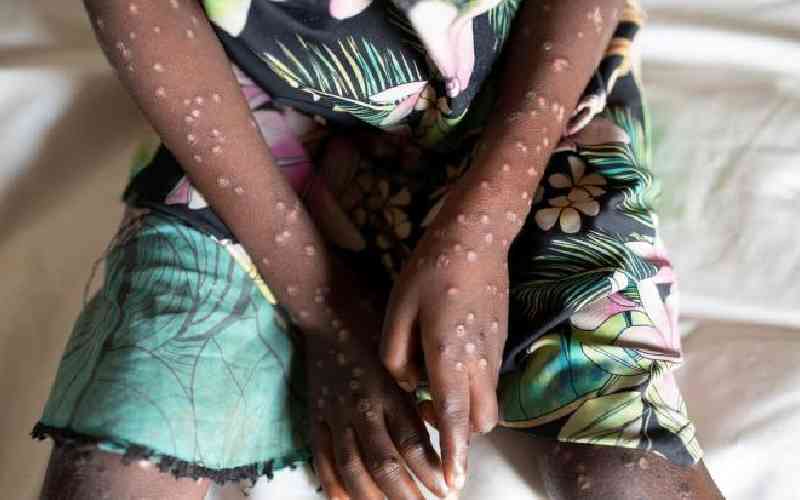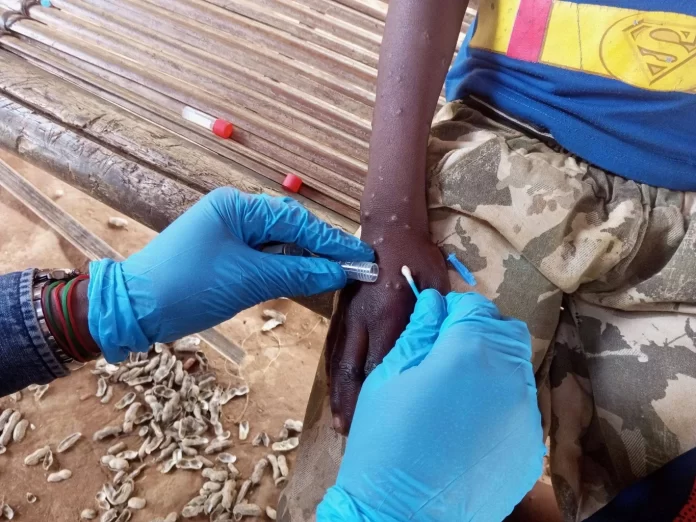By Mercy Kachenge
Nairobi, Kenya: The World Health Organization (WHO), has declared that the recent surge of mpox cases in the Democratic Republic of the Congo (DRC) and across several African nations represents a Public Health Emergency of International Concern (PHEIC) under the International Health Regulations (2005). This declaration highlights the urgent need for global attention and coordinated response to address the escalating outbreak.
According to Dr. Tedros Ahanom Ghebreyesus,WHO Director General, the declaration came on the advice of an International Health Regulations( IHR) Emergency Committee of independent experts who met earlier in the day to review data presented by experts from WHO and affected countries. The Committee informed the Director-General that it considers the upsurge of mpox to be a PHEIC, with potential to spread further across countries in Africa and possibly outside the continent.
He expressed concerns over in declaring the PHEIC ,the emergence of a new clade of mpox “Its rapid spread in Eastern DRC and the reporting of mpox cases in the neighboring countries are very worrying.Combined with the ongoing outbreaks of other mpox clades in DRC and across Africa,it is evident that coordinated international response is crucial in containing these outbreaks and saves lives.He added that he will also share the report of the committee’s meeting that is based on the advice of the committee, issue temporary recommendations to countries” said Dr. Tedros.
According to Dr. Matshidiso Moeti, WHO Regional Director for Africa, “Significant efforts are already underway in close collaboration with communities and governments, with country teams working on the frontlines to reinforce measures against mpox escalating.
“Given the growing spread of the virus, we will further scale up our efforts through coordinated international action to support countries in ending these outbreaks,’’said Dr. Moeti.
According to Professor Dimie Ogoina,Committee Chair ,the current upsurge of mpox in parts of Africa, coupled with the emergence of a new sexually transmissible strain of the monkeypox virus, constitutes an emergency not just for Africa, but for the entire world. Mpox, which originated in Africa and was initially neglected, led to a global outbreak in 2022. It is crucial to take decisive action now to prevent a recurrence of this situation.
This declaration of a Public Health Emergency of International Concern (PHEIC) marks the second time in two years that mpox has been classified as such. Caused by an Orthopoxvirus, mpox was first identified in humans in 1970 in the Democratic Republic of the Congo (DRC) and is regarded as endemic to central and west African countries.
According to the report,in July 2022, the multi-country outbreak of mpox was declared a Public Health Emergency of International Concern (PHEIC) due to its rapid spread through sexual contact across various countries where the virus had previously been unknown. This initial PHEIC was lifted in May 2023 following a sustained decline in global cases.
Mpox has been reported in the Democratic Republic of the Congo (DRC) for over a decade, with a steady annual increase in cases. In the previous year, there was a significant rise in reported cases, and the number of cases this year has already surpassed the previous year’s total, reaching over 15,600 cases and 537 deaths. The emergence of a new strain of the virus, clade 1b, which appears to be spreading primarily through sexual networks and has been detected in neighboring countries, is particularly alarming and a key factor in the declaration of the Public Health Emergency of International Concern (PHEIC).
For the past months, over 100 laboratory-confirmed cases of clade 1b have been reported in four neighboring countries, Burundi, Kenya, Rwanda, and Uganda that had not previously documented mpox. Experts believe the true number of cases is likely higher, as many clinically compatible cases have not been tested. Furthermore, outbreaks involving different clades of mpox have emerged across various countries, each with unique modes of transmission and differing levels of risk.
According to WHO’s Strategic Advisory Group of Experts on Immunization (SAGE), the two vaccines currently used for mpox are recommended and have also received approval from WHO-listed national regulatory authorities, including those in Nigeria and the Democratic Republic of the Congo (DRC).
Additionally, the Director-General has triggered the process for Emergency Use Listing for mpox vaccines, which will accelerate vaccine access for lower-income countries that have not yet issued their own national regulatory approval. The Emergence Listing will also enable partners including the Global Alliance of Vaccine (GAVI UNICEF) to procure vaccines for distribution.
WHO is collaborating with countries and vaccine manufacturers to explore potential vaccine donations and is coordinating with partners through the interim Medical Countermeasures Network to ensure fair access to vaccines, therapeutics, diagnostics, and other essential tools.
Moreover, the organization expects an immediate funding need of US$ 15 million to support surveillance, preparedness, and response efforts. A comprehensive needs assessment is currently underway at all three levels of the Organization.
WHO has released US$ 1.45 million from the WHO Contingency Fund for Emergencies and may need to release more in the coming days to allow immediate scale up in combating mpox. The Organization appeals to donors to fund the full extent of needs of the mpox response.














